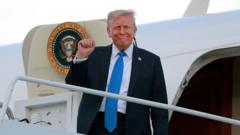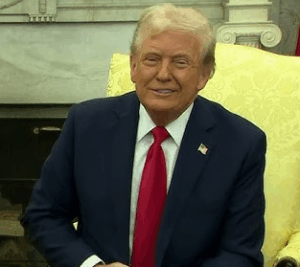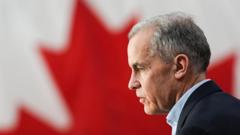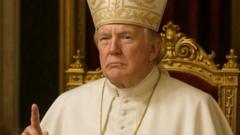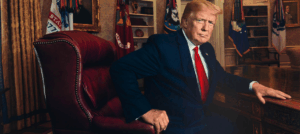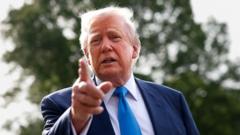On his first day back in office, Donald Trump launched a multitude of executive orders and directives that touch upon various aspects of his policy agenda. From immigration to health organization withdrawal, Trump marked his return to leadership with significant actions that garner both support and contention.
Trump's Sweeping Executive Actions on Day One: A Bold Start to His Second Term
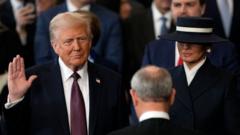
Trump's Sweeping Executive Actions on Day One: A Bold Start to His Second Term
A comprehensive overview of the executive orders signed by President Trump in his initial hours back in office.
These executive orders wield substantial influence, though they can be altered or rescinded by future administrations or through judicial review. Here’s a breakdown of the notable measures Trump enacted shortly after his inauguration as the 47th president of the United States.
Trump initiated a flurry of measures focusing on immigration by declaring a national emergency at the southern US border, aimed at halting illegal immigration and drug trafficking. He reinstated his "Remain in Mexico" policy which mandates that non-Mexican asylum seekers stay in Mexico while awaiting hearings, directly affecting thousands of immigrants.
To boost border security, he enforced a suspension of the US refugee resettlement program for four months and directed military forces to seal off US borders. Additionally, he classified notorious drug gangs and cartels as foreign terrorist organizations, reinforcing his hardline stance on crime related to immigration.
In the realm of social media, Trump supported the Chinese-owned platform TikTok, delaying the implementation of a ban to allow for potential negotiations for a US-based partnership. He simultaneously signed an executive order establishing a new government efficiency agency led by Elon Musk, intending to cut federal costs.
Trump also took strides to reinforce traditional views on sex and gender, asserting that the US will only recognize male and female identities, while similarly abolishing all Diversity, Equity, and Inclusion programs across federal agencies.
On economic matters, the newly sworn-in president directed agencies to address inflation-related issues concerning the cost of living, while reinitiating procedures to withdraw the US from the Paris climate agreement. Trump's actions suggest a shift towards prioritizing fossil fuels, including a promise to ramp up drilling efforts in Alaska.
Furthermore, he issued pardons for nearly 1,600 individuals involved in the Capitol riots, portraying them as victims of political persecution. This move may create a significant ripple effect in the political climate, igniting discussions on the implications of such pardons for extremist groups involved in the insurrection.
In sum, Trump's first day in office was marked by a bold, transformative approach aimed at reshaping the American landscape, highlighting his focus on immigrant policy, social norms, and energy independence. As his administration unfolds, the implications of these actions will be scrutinized by supporters and critics alike, positioning Trump once again at the center of national discourse.
Trump initiated a flurry of measures focusing on immigration by declaring a national emergency at the southern US border, aimed at halting illegal immigration and drug trafficking. He reinstated his "Remain in Mexico" policy which mandates that non-Mexican asylum seekers stay in Mexico while awaiting hearings, directly affecting thousands of immigrants.
To boost border security, he enforced a suspension of the US refugee resettlement program for four months and directed military forces to seal off US borders. Additionally, he classified notorious drug gangs and cartels as foreign terrorist organizations, reinforcing his hardline stance on crime related to immigration.
In the realm of social media, Trump supported the Chinese-owned platform TikTok, delaying the implementation of a ban to allow for potential negotiations for a US-based partnership. He simultaneously signed an executive order establishing a new government efficiency agency led by Elon Musk, intending to cut federal costs.
Trump also took strides to reinforce traditional views on sex and gender, asserting that the US will only recognize male and female identities, while similarly abolishing all Diversity, Equity, and Inclusion programs across federal agencies.
On economic matters, the newly sworn-in president directed agencies to address inflation-related issues concerning the cost of living, while reinitiating procedures to withdraw the US from the Paris climate agreement. Trump's actions suggest a shift towards prioritizing fossil fuels, including a promise to ramp up drilling efforts in Alaska.
Furthermore, he issued pardons for nearly 1,600 individuals involved in the Capitol riots, portraying them as victims of political persecution. This move may create a significant ripple effect in the political climate, igniting discussions on the implications of such pardons for extremist groups involved in the insurrection.
In sum, Trump's first day in office was marked by a bold, transformative approach aimed at reshaping the American landscape, highlighting his focus on immigrant policy, social norms, and energy independence. As his administration unfolds, the implications of these actions will be scrutinized by supporters and critics alike, positioning Trump once again at the center of national discourse.

